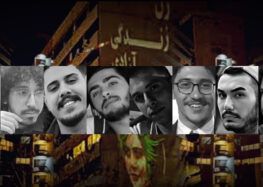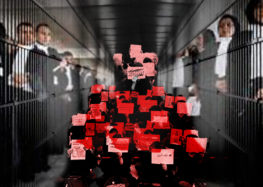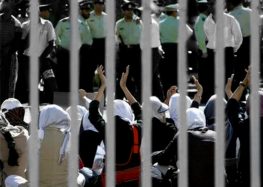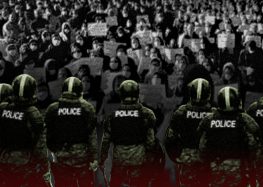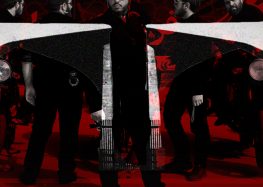Iran’s New Basij Militia Commander More Militaristic Than His Predecessor
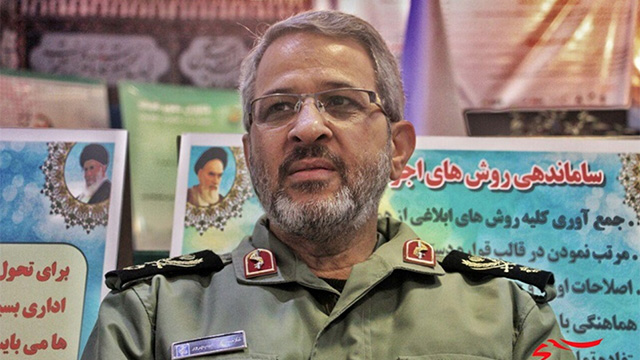
The appointment of ultra-conservative hardliner Gholam-Hossein Gheibparvar as the new commander of Iran’s Basij, a volunteer militia under the authority of the Revolutionary Guards, has raised fears of increased intimidation and repression of anyone deemed guilty of political dissent.
Brigadier General Gheibparvar believes, in contrast to the Constitution, that the Revolutionary Guards holds the authority to interfere in all aspects of life in the Islamic Republic to protect the revolution. His track record of iron-fist policies significantly contributed to his rise in Iran’s military apparatus.
His predecessor, Mohammad Reza Naghdi—who was put on the U.S. sanctions list in 2011 for “being responsible for or complicit in serious human rights abuses in Iran since the June 2009 disputed presidential election”—was similarly appointed as Basij commander in 2009 because of his reputation as the ruthless head of Tehran’ police intelligence unit in the 1990s.
“Today Gen. Naghdi and I are able to confront traitors with the backing of the Islamic Revolution and the Basij forces,” said Gheibparvar on December 11, 2016. “I don’t compromise when it comes to defending the revolution, no matter what anti-revolutionary media may say or write.”
Supreme Leader Ali Khamenei, who appointed Gheibparvar on December 7, 2016, instructed him at the appointment ceremony to “strengthen the people’s presence” in the Basij and “survey the enemy’s activities and prevent any infiltrations.”
As a sign of obedience and loyalty, Gheibparvar addressed Khamenei as “imam” during his acceptance speech. “The art of the Basij is to extract and organize the people’s potential to defend the revolution and establish a new Islamic civilization,” he said. “This is doable.”
Militaristic Revolutionary
Before his promotion at the end of 2016, since 2006 Gheibparvar was commander of the Revolutionary Guards in Fars Province. During his tenure he played a key role in suppressing the Green Movement—which grew out of the peaceful street protests against Iran’s disputed presidential election in the summer of 2009—in Fars’ capital, Shiraz. Four days after his promotion to the Basij, Gheibparvar publicly referred to Green Movement leaders Mehdi Karroubi, Mir Hossein Mousavi, and Mousavi’s wife Zahra Rahnavard—who have all been kept under extrajudicial house arrest since February 2011—as “dirty politicians.”
“In the past I have described leaders of the sedition as dirty politicians and I stand by my position. Not even heavenly water can cleanse these dirty politicians unless they repent in front of our great nation and the supreme leader of the Revolution,” declared Gheibparvar during a visit to a Basij exhibition on December 11.
The widespread peaceful protests against the 2009 election results, which were met with violent state repression, are still a highly sensitive topic in Iran, and are referred to by hardline authorities as the “sedition.”
“The leaders of the sedition committed treason,” said Gheibparvar on January 6, 2014, according to the Fars News Agency, which is closely associated with the Revolutionary Guards. “They are criminals. In my opinion, Mir Hossein Mousavi and Karroubi are ‘corrupt on Earth,’” a charge that is legally punishable by death in Iran.
In 2009 Gheibparvar led a group of thugs in attacking the headquarters of a prominent senior cleric, Ayatollah Ali Mohammad Dastgheib, in Shiraz. The office of the moderate member of the Assembly of Experts was ransacked while many of his supporters were severely beaten by the thugs.
On September 29, 2013, forces under Gheibparvar’s command used tanks to crush satellite dishes confiscated from people’s homes in Shiraz.
Gheibparvar has also been blamed by Ali Motahhari, a conservative member of Parliament (MP), for the violent March 2015 mob attack on a taxi Motahhari was travelling in. The outspoken MP has publicly advocated for ending the house arrests of Mousavi, Karroubi and Rahnavard.
According to a profile of the new Basij commander published by the Fars News Agency on December 7, 2016, Gheibparvar joined the Revolutionary Guards during the Iran-Iraq War (1980-88) and led political and ideological training programs.
In the early 2000s he headed the Revolutionary Guards’ ground forces training programs and later became the commander of the Guards’ 25th Karbala Division in Mazandaran Province. In 2006 he headed the 19th Fajr Division in Shiraz (the position ended in 2008) while serving as the Revolutionary Guards commander in Fars Province, a position he kept until the end of 2016.
Following the death of Revolutionary Guards’ Brigadier General Hossein Hamadani in Syria on October 8, 2015, Gheibparvar, while keeping his post in Fars, replaced Hamadani as commander of the Imam Hossein Headquarters on December 9, 2015. The Imam Hossein battalions operate as elite military units currently charged with achieving Iran’s military goals in Syria.
Expanding the Revolutionary Guards’ Role
As the new chief of the Basij, Gheibparvar, who has described reformist politicians as enemy forces operating inside the country, could work to increase the Revolutionary Guards’ interference in elections, even though they are legally forbidden to do so.
According to Article 24 of the Presidential Election Law (2013): “Police forces have a duty to keep order and prevent any kind of disturbance in the process of the elections and are responsible for protecting the ballot boxes. Military and police forces are not permitted to interfere in the implementation and supervision of the elections.”
According to Article 143 of Iran’s Constitution, “The Army of the Islamic Republic of Iran is responsible for guarding the independence and territorial integrity of the country, as well as the order of the Islamic Republic.”
Article 150 goes on to state that the force used by the Revolutionary Guards “is to be maintained so that it may continue in its role of guarding the revolution and its achievements. The scope of the duties of this Corps, and its areas of responsibility, in relation to the duties and areas of responsibility of the other armed forces, are to be determined by law, with emphasis on brotherly cooperation and harmony among them.”
During a speech in 1982, the late leader of the 1979 revolution, Ayatollah Ruhollah Khomeini, strongly forbade the Revolutionary Guards from interfering in political processes, warning that it would “surely corrupt and pervert them”:
“My emphatic counsel to the armed forces is to observe and abide by the military rule of non-involvement in politics. Do not join any political party, group or faction. No military man, security policeman, no Revolutionary Guard or Basij may enter into politics…Therefore, the government, the nation, the Defense Council the Islamic Consultative Assembly are all charged with the religious and national responsibility to oppose, from the very beginning, any interference in politics or any action against the interests of Islam and the country by the armed forces, regardless of category, class, branch and rank. Such involvement will surely corrupt and pervert them. It is incumbent on the leader and the Leadership Council to prevent such involvement of the armed forces by decisive action so that no harm may beset the country.”
However, Gheibparvar and other members of the Guards do not consider the organization a solely military entity and rather as the “defender of the Islamic Revolution” with the authority to interfere in any area they deem fit, including elections.
Opposing Rouhani
A year after the election of the centrist cleric Hassan Rouhani to the presidency in 2013, Gheibparvar gave a speech at a Basij student event in Shiraz accusing the president’s reformist allies of working to hijack the country’s February 2016 elections.
“The reformists are determined to take over the elections for Parliament and the Assembly of Experts and then they will take control of universities and you will see the type of speakers who will show up here,” he declared in September 2014. “There’s no guarantee that the 2009 sedition will not be repeated.”
At another speech on December 26, 2014 in honor of fallen soldiers of the Iran-Iraq war in the city of Kazeroun, Gheibparvar declared that, barring a miracle, U.S.-Iran relations would likely remain hostile.
“Iran and America will stop being enemies only under two conditions,” he said. “One is if the U.S. president becomes a Muslim and declares allegiance to the Supreme Leader [Ali Khamenei]. The other is if Iran rids itself of Islam and the Islamic Revolution.”
“It’s not possible for the leaders of Europe and America to become Muslims and there’s no way we will get rid of Islam and the Islamic Revolution, so I don’t know why some people still fantasize about the day when we will establish peaceful relations with the Americans.”
He went on to warn that his support for President Rouhani was conditional.
“Mr. Rouhani is our president and the supreme leader supports him and we, too, support him,” he said. “But it’s not as if some people can take advantage of the new government to whitewash the crimes of sedition leaders. If anyone tries to cross that red line, Imam Khamenei’s soldiers will stand against him with the help of Almighty God.”
On February 4, 2015, Gheibparvar said the “sedition’s leaders” included former reformist President Mohammad Khatami (1997-2005).
“In 2009 the seditionists passed on intelligence to the enemy [U.S.], threatened national security and dragged the country through the slaughterhouse,” he said. “They committed treason. It’s only logical for me to say for certain that Mohammad Khatami was one of the leaders of the sedition. In fact his role was deeper than that of Mousavi and Karroubi.”
He also warned Fars Province officials that if they did not stand against reformists, “I will do it myself as a small soldier of God.”
Attacking a Moderate Ayatollah
During the peaceful protests against the 2009 election results, which then presidential candidates Mousavi and Karroubi disputed, moderate Ayatollah Ali Mohammad Dastgheib sided with the opposition leaders.
On October 5, 2009 a group of senior conservative officials and clerics sent an open letter to Khamenei publicly distancing themselves from Dastgheib. Gheibparvar and several other senior Revolutionary Guards officers were among those who signed onto the letter.
Nearly three months later on December 29, a group of Revolutionary Guards and Basij members attacked Dastgheib’s office in the Qoba Mosque in Shiraz. The attackers were egged on by Khamenei’s representative in the Revolutionary Guards’ Fajr Division, Hojatoleslam Abolqasem Alizadeh.
“A group of troublemakers who think of themselves as defenders of the state destroyed the sanctity of Qoba Mosque and the Abu Saleh Seminary School in front of a number of municipal and military officials,” said a statement issued on December 30 by Dastgheib’s office.
Attacking a Conservative MP
On March 9, 2015 plainclothes agents linked to the Revolutionary Guards’ Fajr Division under Gheibparvar’s command smashed the windows of a taxi carrying MP Ali Motahhari while shouting slogans against him.
The conservative MP from Tehran had travelled to Shiraz to give a speech at a student event in December 2013 after blaming the state-controlled Islamic Republic of Iran Broadcasting (IRIB) station and the Revolutionary Guards of causing the 2009 election crisis and repeating his call for the release of Mousavi, Rahnavard, and Karroubi from house arrest.
On March 13, 2015, Shiraz’s Friday prayer leader Assadollah Imani tacitly supported the attack in a sermon: “If someone breaks the sanctity of the state, shouldn’t he expect [retaliation]? You reap what you sow.”
Motahhari used Imani’s words as evidence for his supporting “role” in the attack while indirectly pointing at Gheibparvar as the main instigator.
“I thank you for exposing your role in this incident,” he wrote in a public post on his website. “Naturally, Interior Ministry investigators should talk to you as a suspect. I hope the other suspect who supplied motorcycles and pepper spray to the attackers will also come forward and confess, even though we all know who he is.”
In a complaint filed on May 26, 2015 by Motahhari’s lawyer, Mostafa Tork Hamadani, the attackers were described as “eight members of a certain organization,” meaning the Revolutionary Guards.
“The case is being investigated by the Fars Province Military Court because the attackers were members of the military,” he added.

